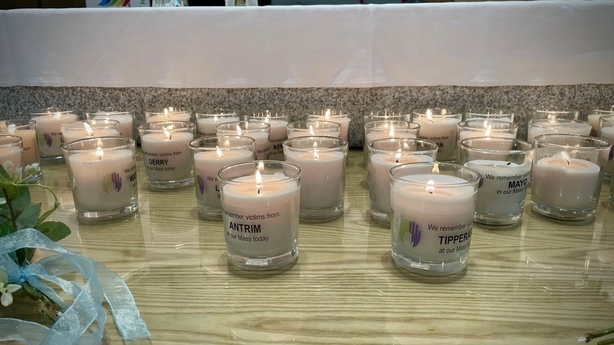A woman whose husband was jailed for eight years for coercive control and rape has urged victims of crime "to take the first step and talk to somebody" adding that "nobody should suffer in silence".
Speaking as part of European Day for Victims of Crime, Kathleen Correia said her message was "one of hope".
Ms Correia met her husband Sergio in Portugal in 2006. They married in 2012. Last October, 48-year-old Sergio Correia was jailed for eight years for the rape and coercive control of his wife.
"Being a victim of crime is very traumatising. It derails your life. It shatters your confidence, and it's very hard, you know, to see hope and the future is difficult, but there is a lot of support and help there.
"The victim assistance are a vital organisation as well as The Rape Crisis Centre; they have offered a lot of support and encouragement and advocation for me over the years. The message today is a message of hope."
Ms Correia urged victims of crime to speak out to family, friends or support groups.
"You need to speak to somebody, a friend or family member or victim assistance, the DPS, the divisional Protective Services Unit in An Garda Síochána are fantastic.
"They supported me and were by my side every step of the way. They were so empathetic - they believed me.
"I got justice and I've been supported. Nobody should suffer in silence. I think you'll always have support, and you just have to take the first step and talk to somebody."
Ms Correia was among many people who attended a special mass at Knock Basilica to remember all victims of crime and trauma as part of events to mark European Day for Victims of Crime.

Chairperson of the Federation for Victim Assistance Tom Brophy said it is an awareness day that lets people know there are organisations that care, and there is support available that tries to understand the plight of the victim and the difficulties.
"Therein we set a process and change where we try to put the victim on the right path. We get calls from around the country. We have also dealt with calls from across Europe. There's a huge demand."
Mr Brophy said some victims are in fear of going through the system in case there is retribution from the perpetrators and others may have a fear of the unknown.
"Every victim needs to be listened to and understood. The challenge we have is to direct them in the right path that will give them the help that they need on the road to recovery.
"We have a close relationship working with An Garda Síochána. We're thankful for the work that gardaí carry out.
"We're thankful that they channel a lot of victims to our organisation, and from there on, our coordinator puts the necessary steps in place for the victim's recovery."
Mr Brophy said costs associated with legal proceedings are a challenge for many victims.
"We find that a lot of victims find it hugely challenging to try and get free legal aid. Now, sometimes it could be a nine to 12 week wait for that service. It can be a longer.
"Free legal aid is a huge obstacle, and this is where the victim often sees the perpetrator getting free legal aid quite easily," he added.
Mr Brophy acknowledged the work of the previous minister for justice Helen McEntee and the current Minister for Justice Jim O’Callaghan in making the criminal justice system more accessible and easier for victims to navigate.
"We do have to acknowledge the work that governments are doing in that respect, but we also must be very cognisant of the difficulties and the challenges that victims go through on a daily basis," Mr Brophy said.

